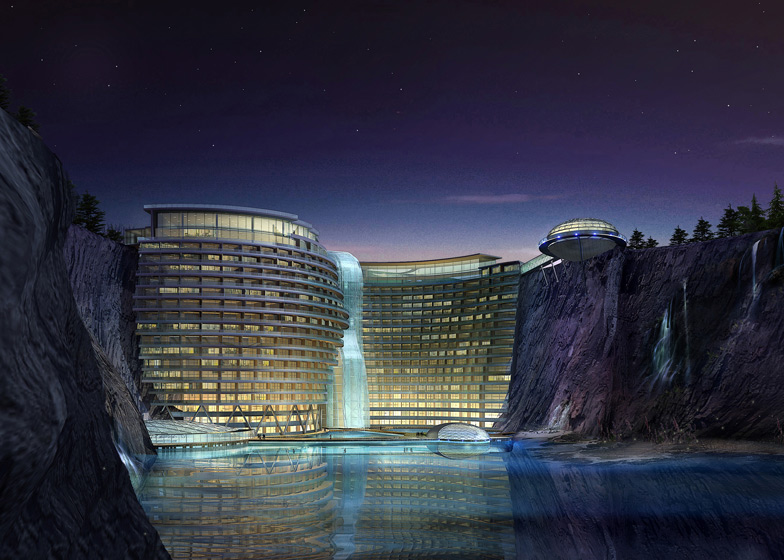News: construction has started on a hotel resort that will nestle into the 100 metre-high rockface of an abandoned water-filled quarry outside Shanghai.
A huge waterfall will pour down from the roof of the 19-storey hotel complex, which will have part of its body built into the cave and two of its floors submerged beneath the water.
An extreme-sports facility will be cantilevered over the quarry, offering rock climbing and bungee jumping, and there will also be an underwater restaurant facing a ten-metre deep aquarium.
The Songjiang Hotel is designed by UK architecture firm Atkins, who won the competition bid in 2006. Construction has just begun and will take up to three years, although the hotel could open in 2015.
Once complete, the hotel will offer around 400 rooms, as well as conference facilities for up to 1000 people, a banqueting hall, restaurants, a swimming pool and a water-sports centre.
The building will use geothermal technologies to generate its own electricity and lighting, while greenery will blanket a roof that extends just two storeys above the edge of the quarry.
China remains at the centre of a construction boom, as nine of the 20 tallest buildings underway in 2012 are located there. Other major projects set for construction in the country include a 838-metre skyscraper with a 90-day construction period and a car-free "satellite city" for 80,000 people. See more architecture in China.
Other radical hotel proposals to surface in recent months include a 300-metre "space hotel" for Barcelona and the world's largest underwater hotel planned for Dubai. See more hotels on Dezeen.
Here's a short statement from Atkins:
Atkins is providing architecture, structural and civil engineering services for this leisure resort in China which includes extreme sports facilities, visitor centre and a five-star luxury hotel with some levels of the hotel situated under water. Sustainability is integral to Atkins' design of this unique resort, built into an abandoned, water-filled quarry.
Our design solution includes the use of green roofing and exploiting the site's geothermal heat to generate electricity and heating. A naturally-lit internal atrium incorporates the existing rock face, with its waterfalls and green vegetation.

